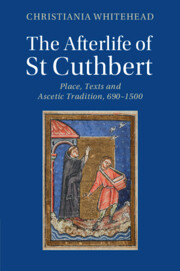Book contents
- The Afterlife of St Cuthbert
- Cambridge Studies in Medieval Literature
- The Afterlife of St Cuthbert
- Copyright page
- Contents
- Abbreviations
- Acknowledgements
- Introduction
- Chapter 1 Blessings on Pregnant Seals: Constructing Cuthbert’s Asceticism in His Anonymous and Bedan vitae, and the Historia ecclesiastica, 690–740
- Chapter 2 Travels with My Coffin: The Dislocation and Defence of the Community of St Cuthbert in the Historia de Sancto Cuthberto, 793–1050
- Chapter 3 The Bishop in the Rain: Celebrating the New Order in Symeon of Durham’s Libellus de exordio, Old English Durham and the Capitula de miraculis et translationibus sancti Cuthberti, 1066–1140
- Chapter 4 Expansions and Contractions of Saintly Space in Two Cuthbertine Miracle Collections: Reginald of Durham’s Libellus de admirandis, and De mirabilibus, 1150–1210
- Chapter 5 Godric of Finchale, Bartholomew of Farne and the ‘Irish’ Libellus de ortu Sancti Cuthberti: Three Eremitic Responses to St Cuthbert, 1150–1210
- Chapter 6 Delimiting Sanctity in Two Meditations from Farne Island: The Exortacio ad contemplacionem and the Meditaciones of the Monk of Farne, 1210–1370
- Chapter 7 Vernacular Epitomes and Encyclopedias: Southern Legendaries and the Metrical Life of St Cuthbert, 1270–1500
- Conclusion
- Notes
- Bibliography
- Index
- Cambridge Studies in Medieval Literature
Chapter 7 - Vernacular Epitomes and Encyclopedias: Southern Legendaries and the Metrical Life of St Cuthbert, 1270–1500
Published online by Cambridge University Press: 03 December 2020
- The Afterlife of St Cuthbert
- Cambridge Studies in Medieval Literature
- The Afterlife of St Cuthbert
- Copyright page
- Contents
- Abbreviations
- Acknowledgements
- Introduction
- Chapter 1 Blessings on Pregnant Seals: Constructing Cuthbert’s Asceticism in His Anonymous and Bedan vitae, and the Historia ecclesiastica, 690–740
- Chapter 2 Travels with My Coffin: The Dislocation and Defence of the Community of St Cuthbert in the Historia de Sancto Cuthberto, 793–1050
- Chapter 3 The Bishop in the Rain: Celebrating the New Order in Symeon of Durham’s Libellus de exordio, Old English Durham and the Capitula de miraculis et translationibus sancti Cuthberti, 1066–1140
- Chapter 4 Expansions and Contractions of Saintly Space in Two Cuthbertine Miracle Collections: Reginald of Durham’s Libellus de admirandis, and De mirabilibus, 1150–1210
- Chapter 5 Godric of Finchale, Bartholomew of Farne and the ‘Irish’ Libellus de ortu Sancti Cuthberti: Three Eremitic Responses to St Cuthbert, 1150–1210
- Chapter 6 Delimiting Sanctity in Two Meditations from Farne Island: The Exortacio ad contemplacionem and the Meditaciones of the Monk of Farne, 1210–1370
- Chapter 7 Vernacular Epitomes and Encyclopedias: Southern Legendaries and the Metrical Life of St Cuthbert, 1270–1500
- Conclusion
- Notes
- Bibliography
- Index
- Cambridge Studies in Medieval Literature
Summary
With the exception of the South English Legendary, vernacular versions of Cuthbert’s life and miracles are slow to emerge, and it is not until the fifteenth century that we encounter a series of large and small-scale shifts into Middle English. The small-scale epitomes, written in the midlands and south in the course of compiling vernacular legendaries, afford us the opportunity of seeing how Cuthbert is treated from a ‘non-northern’ perspective, when set alongside universal and allied native saints. What is judged his quintessence when his life is epitomized in just a few hundred words? Alternatively, in Cuthbert’s Durham heartland, the shift into the vernacular also sees an urge towards the large-scale compilation, drawing together the different versions of Cuthbert’s life, miracles and church history, into an encyclopedic composite offering its vernacular reader access to the entirety of the preceding textual tradition. The anonymous Metrical Life of St Cuthbert, an example of this impulse, is analysed to explore how the restatements of episodes from many earlier Cuthbertine texts speak to the anxieties and ambitions of the fifteenth-century Benedictine corporation at Durham.
Keywords
- Type
- Chapter
- Information
- The Afterlife of St CuthbertPlace, Texts and Ascetic Tradition, 690–1500, pp. 173 - 223Publisher: Cambridge University PressPrint publication year: 2020



